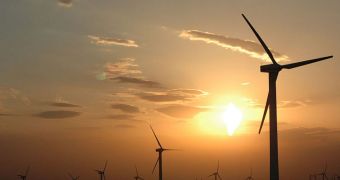According to the latest scientific study on the issue, global warming and climate change will not affect the power output of wind farms in any discernible manner. Slight fluctuations are likely to appear, but they will not influence the overall production levels significantly.
While the work needs to be expanded to an international level as well, its conclusions are entirely valid in the United States, where the investigation was conducted. Many experts had voiced concern about a potential influence of this nature, and this study is meant to put those doubts to rest.
Furthermore, it would even appear that – under some specific circumstances – the amount of wind power available for harvesting might actually increase. This new investigation was conducted using funds from the US National Science Foundation (NSF).
Details of the research appear in a paper published in this week's issue of the esteemed journal Proceedings of the National Academy of Sciences (PNAS). The work was conducted by two experts from the Indiana University (IU) Bloomington.
The scientists focused their attention on major wind corridors, which are the areas that would yield the highest productivity if wind farms were installed there. The main factors the experts tested for were wind speed and consistency, the two most important traits that dictate the selection of a wind farm site.
“There are a lot of myths out there about the stability of wind patterns,” explains the coauthor of the new investigation, IU professor of atmospheric science, Rebecca Barthelmie. She explains that both governments and corporations want to know for sure how wind power will fare in the future.
At this point, it is becoming increasingly clear that authorities are unwilling to take the necessary steps to mitigate the effects of global warming. As such, experts need to plan for the worst scenarios.
As far as the production of wind-derived electricity goes, there is no reason for alarm, the IU experts say. Warmer temperatures may elevate the speed of winds slightly, but that is the entire extent of the effects that global warming will have in this field.
“Areas where the model predicts decreases in wind density are quite limited. Many of the areas where wind density is predicted to decrease are off limits for wind farms anyway,” explains the principal investigator of the new work, Sara Pryor.
The expert, who holds an appointment as a IU provost professor of atmospheric science, adds that the study revealed “quite a bit of variability in predicted wind densities, but interestingly, that variability was very similar to the variability we observe in actual wind patterns.”
“The impact on future wind energy production is positive as current wind patterns are expected to stay as they are. This means that wind energy production can continue to occur in places that are currently being targeted for that production,” she concludes.

 14 DAY TRIAL //
14 DAY TRIAL //